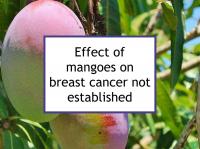Mangoes (Mangifera indica) are an excellent source of lupeol, a good source of beta-carotene, and also incorporate some vitamin C. Mango flesh is also a source of ellagic acid, ferulic acid, gallic acid, mangiferin, protocatechuic acid and quercetin, but the peel contains far more. However, the peel also incorporates urushiol, which can cause allergic reactions.
Mangoes and their components have been demonstrated to act as powerful antioxidants, have radioprotective properties, help prevent atherosclerosis, and improve glucose and lipid parameters in experimental mice fed a high-fat diet. Mango peel compounds have been reported to have antiproliferative and pro-apoptotic activities (which trigger programmed cell death) against human leukemia, as wells as human lung, colon, ovarian and prostate cancer cells.
Lupeol, a component of mango pulp (flesh), has been shown to inhibit proliferation and increase apoptosis of prostate, pancreatic and skin cancer cells in laboratory mice. One European population study found that consumption of mangoes was associated with lower risk of gallbladder cancer. A Mexican study found that consumption of mangoes was associated with lower risk of gastric cancer.
Breast cancer-related effects of eating mangoes
While mangoes contain compounds that suggest the fruit may have chemopreventive properties against breast cancer, no major population studies have been performed to evaluate this potential.
Lupeol
Lupeol has been demonstrated to reduce the migration and invasion of triple negative breast cancer cells in a dose-dependent manner. Lupeol has also been shown to inhibit the proliferation of both ER+/PR+ and HER2+ breast cancer cells.
In addition, lupeol has been demonstrated to increase the treatment effects of doxorubicin in both ER+/PR+ and triple negative breast cancer cells by reducing cell migration and increasing apoptosis (programmed cell death). Lupeol has also been reported to resensitize drug-resistant cancer cells to chemotherapy.
Beta-carotene
Higher levels of carotenoids and vitamin A (retinol) in the blood of breast cancer survivors have both been found to be associated with greater likelihood of breast cancer-free survival. A Scandinavian study found that dietary (but not supplemental) beta-carotene had a protective effect against lobular breast cancer in postmenopausal women. Another European study reported that high intake of beta-carotene was protective against breast cancer in postmenopausal women using hormone replacement therapy (HRT). The same study also found that dietary beta-carotene was associated with lowered risk of breast cancer in postmenopausal women with relatively high alcohol consumption.
Another study reported that beta-carotene enhanced the cytotoxicity of doxorubicin in both hormone receptor positive (ER+/PR+) and triple negative (ER-/PR-/HER2-) breast cancer cells. Beta-carotene has been demonstrated to reduce multidrug resistance in cancer cells. In addition, treatment with beta-carotene has been shown to reduce cardiotoxicity induced by the chemotherapy drug cisplatin in rats.
Additional comments
Mangosteen
Despite the similarity in the names, mangosteen (Garcinia mangostana), a Southeast Asian tropical fruit, is not related to mango.
Mango peel compounds
Mango peel compounds have been demonstrated to have antiproliferative and pro-apoptotic activities in human hormone receptor positive ER+/PR+, hormone receptor negative (ER-/PR-), and HER2-positive (HER2+) breast cancer cells. Gallic acid has been shown to increase the effectiveness of paclitaxel chemotherapy in ER+/PR+ breast cancer cells. Mangiferin, which is present in the flesh but more abundant in the peel, has been shown to enhance the treatment effects of doxorubicin in ER+/PR+ breast cancer cells.
However, mangiferin and extracts rich in mangiferin have also been shown to increase endothelial cell migration, which could possibly assist angiogenesis (the formation of new blood vessels) in established tumors.
Below are links to recent studies concerning this food and its components. For a more complete list of studies, please click on mango.
